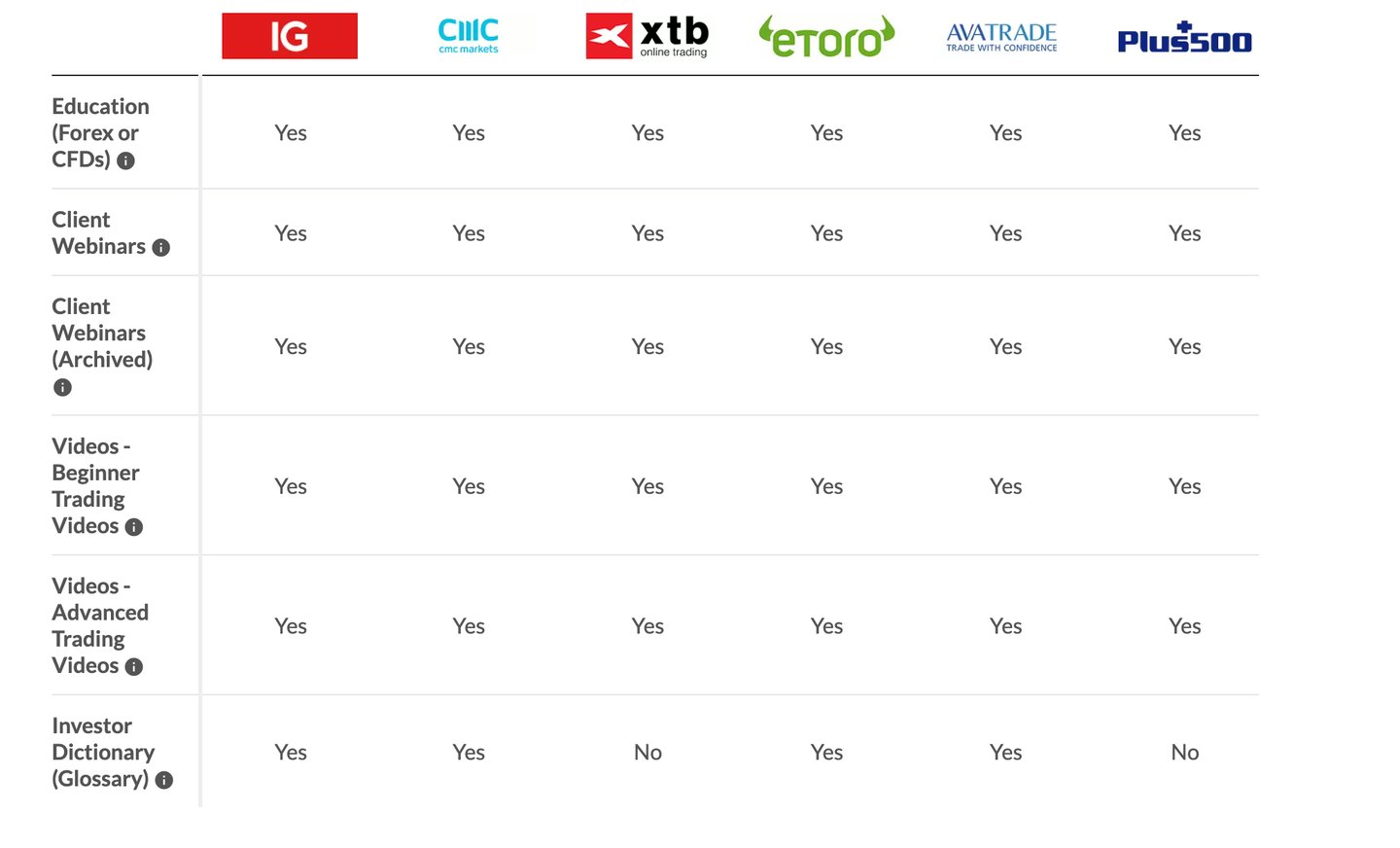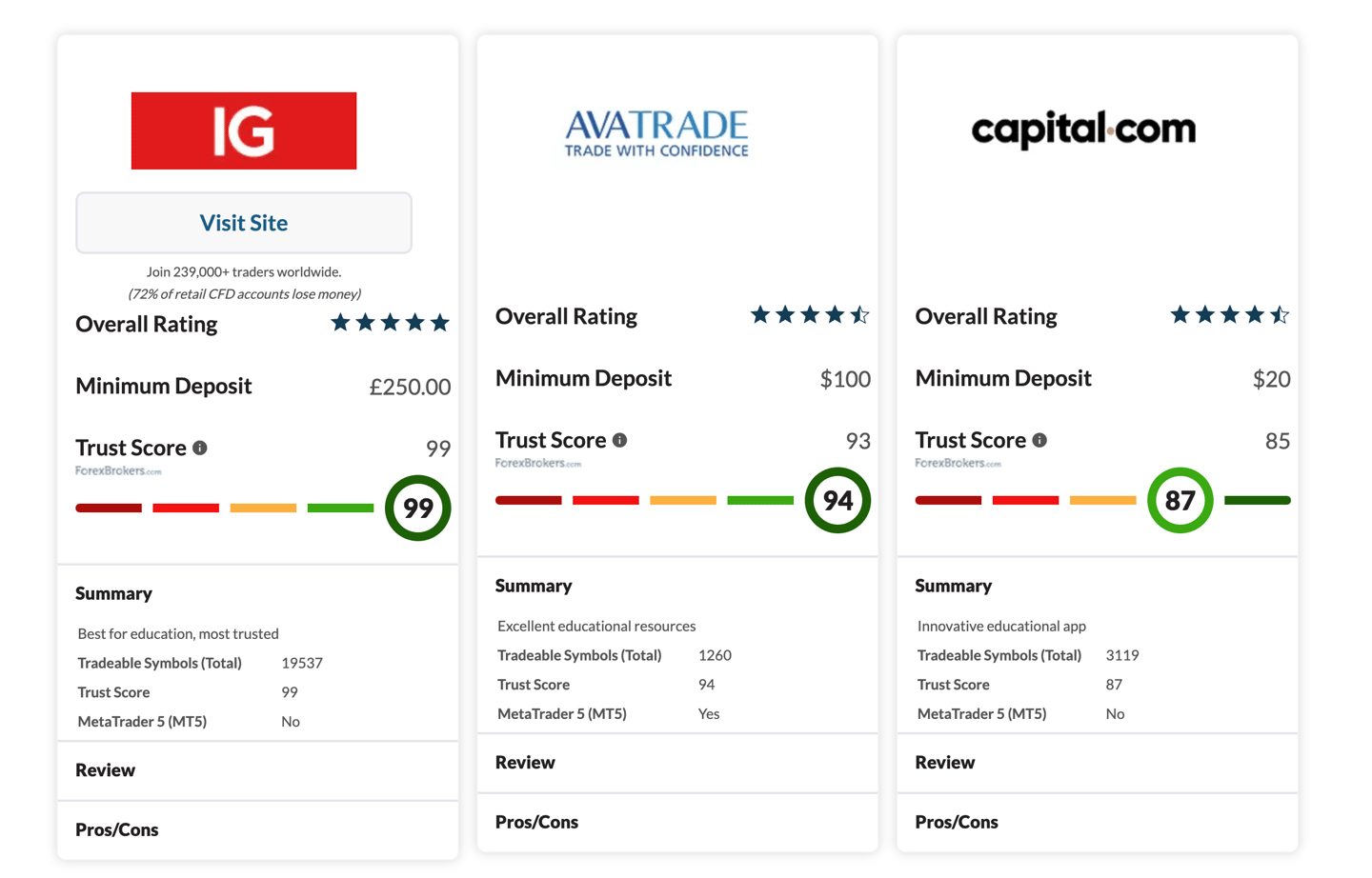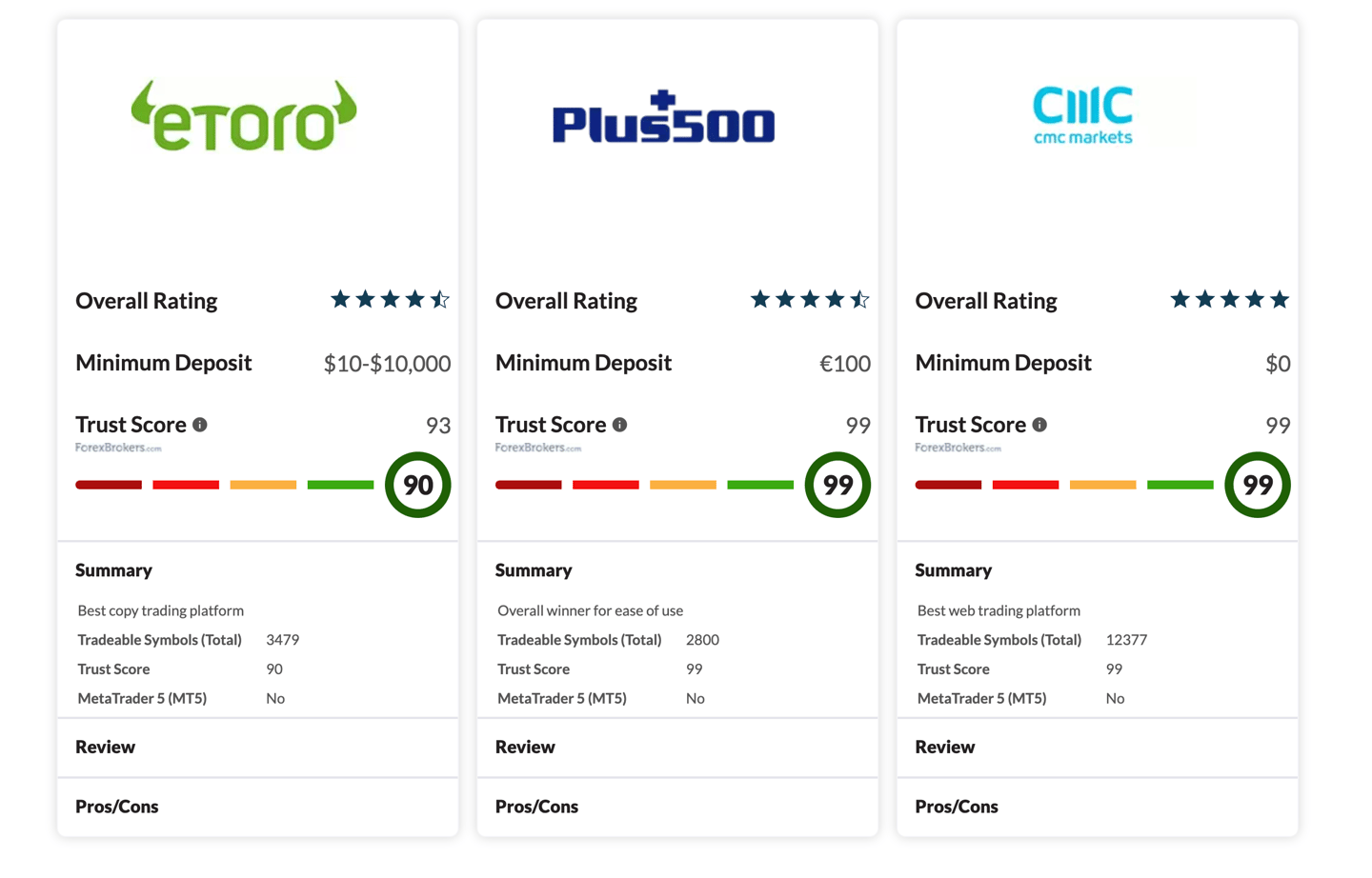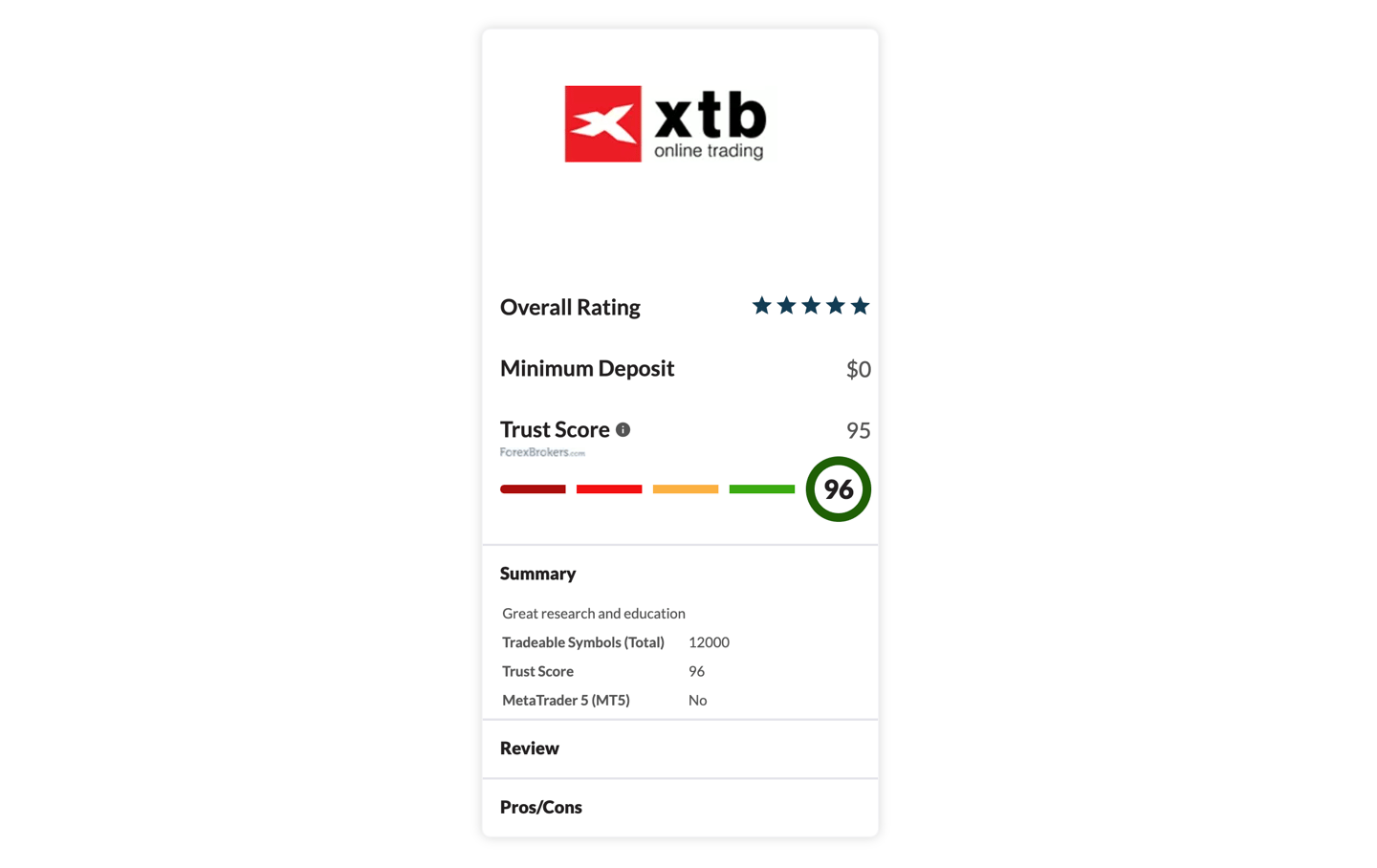forexfinviz.com is committed to the highest ethical standards and reviews services independently. Learn How We Make Money
Best Forex Brokers for Beginners in 2023

Written by Jack
Edited by John
Fact-checked by Joey
forexfinviz.com has been reviewing online forex brokers for over six years, and our reviews are the most cited in the industry. Each year, we collect thousands of data points and publish tens of thousands of words of research. Here's how we test.
CFDs are complex instruments and come with a high risk of losing money rapidly due to leverage. 72.5% of retail CFD accounts lose money. You should consider whether you understand how CFDs work and whether you can afford to take the high risk of losing your money.
The best forex brokers for beginners all share three essential qualities.
The first and most important quality is the broker's status as a well-regulated and highly trusted brand. Second is the provision of a user-friendly web-based platform with a balanced variety of educational resources. Third is access to quality and actionable market research.
Each year, our research team spends countless hours opening demo accounts, navigating various forex platforms and mobile apps, conducting market research, testing website usability, and watching educational videos and webinars.
CFDs are complex instruments and come with a high risk of losing money rapidly due to leverage. Between 74% and 89% of retail investor accounts lose money when trading CFDs. You should consider whether you understand how CFDs work and whether you can afford to take the high risk of losing your money.
What is forex trading?
Forex trading is the process of exchanging one currency for another — known as buying or selling currency pairs — based on prevailing exchange rates from the forex market. The forex market is the largest global market, with nearly $6.59 trillion in currency traded on average per day.
What is a forex broker?
When trading foreign currencies, you use a forex broker (also known as a currency trading broker) to place your trades. When you trade forex, you buy or sell in currency pairs, such as the "EUR / USD" (euro / U.S. dollar). You open an account, deposit funds, then use the broker's trading platform to buy and sell currency using margin. The forex markets are open 24 hours a day, five days a week.
The Best Forex Brokers for Beginners
Here's a summary of the best forex brokers for beginner forex traders.
IG- Best for education, most trusted
AvaTrade - Excellent educational resources
Capital.com - Innovative educational app
eToro - Best copy trading platform
Plus500 - Overall winner for ease of use
CMC Markets - Best web trading platform
XTB - Great research and education


Forex trading platforms education comparison
Taken from our forex broker comparison tool, here's a comparison of the education features for the best forex brokers for beginners.
How do I start trading forex?
Here are the 8 steps to start trading forex with a trusted broker:
Study free educational material.
Open a free demo account and practice.
Learn how to use the trading software.
Develop a trading strategy.
Open a live account with a trustworthy, well-regulated forex broker.
Deposit a small amount of risk capital.
Focus on managing percentage returns.
Only scale once you’ve established a consistent track record.
Tips for beginners:
Before depositing real money, open a free demo account that lets you get a feel for how the broker’s trading platform works.
After you’ve learned how to use the software and have practiced trading with the demo (virtual) account, move on to a live forex trading account with a trusted forex broker.
Always begin with an amount of capital that you can afford to lose before deciding to invest more serious amounts.
Can I teach myself forex trading?
Yes, and while studying the fundamentals of forex trading won’t guarantee success in the forex markets, it's an important first step for beginner forex traders. The good news is that the best forex brokers offer a wide range of free educational materials in a variety of formats. We’ve compiled some free beginner’s resources as well as some expert tips for beginners to aid you in your forex educational journey:
Free forex trading educational courses and resources:
BabyPips - School of Pipsology.
The Global FX Code - Best practices for the forex industry.
NFA Forex Guide, and CFTC regulations (applicable to U.S. forex brokers).
IG Academy from IG.
AvaTrade’s Learning center.
Capital.com’s Learning courses.
eToro Academy from eToro.
TMGM Academy from TMGM.
Expert tips for beginner forex traders:
Free versus paid educational content: Many forex education companies charge for their services, but our research has found that some of the best educational content is available directly from the online forex brokers themselves – though not all brokers offer comprehensive educational options.
Content from brokers versus third parties: Working with a trusted and regulated online broker gives you the added benefit of being able to reach out to their customer support team to speak with a trading specialist. Speaking with someone on the trading desk can help beginners find answers to general forex trading questions – but keep in mind that brokers cannot give you advice or recommendations on what to buy or sell.
Ease of use: Trading software can vary in quality from broker to broker, and some platforms can be far more complex to learn than others – especially if you have limited forex trading experience. Plus500's simple platform design makes it a good one for learning the fundamentals. Some brokers, like IG, offer learning courses that feature progress tracking and quizzes designed to test your knowledge as you move through the material.
How to develop a forex trading strategy in ten steps
Here are some questions every trader should ask themselves when creating an investment strategy or forex trading methodology:
Set goals: What are the specific goals I want to reach with my trading strategy?
Manage time: How much time do I have each day to dedicate to trading?
Capital commitment: What is my ideal trading budget for accomplishing my goals, and what is the most I am willing to risk overall?
Trade frequency: What’s the number of trades I should aim for each week?
Factor risk/reward: What is the maximum risk/reward target for each trade that will still align with my goals, and what is my overall percentage risk tolerance?
Analyze price action and research: How will I identify trading opportunities?
Opening a position: How will I decide when to enter a trade?
Closing a position: How will I decide when to exit a trade early, or to modify my stop-loss/limit levels if my expectation of market conditions changes before my targets are reached?
Calculate your odds: What winning percentage do I need in order to be profitable (after accounting for my trading costs)?
Use your trading statistics: How long should I stick to my trading plan and establish a track record of results, before modifying my strategy or deciding to invest more money?
How much money do you need to trade forex?
The amount of money you will need to trade forex depends on several factors, including your expected trade sizes, risk threshold per trade, the available margin requirements from the broker (i.e., leverage), and any minimum deposit requirement to open your account.
Let’s look at an example:
Say that you plan to trade one mini lot (10,000 units) of the euro currency, and your forex broker offers a maximum of 20:1 leverage. Your trading funds will need to cover at least 5% of the trade value just for the margin, and another €1 for every pip you plan on risking when the market moves against your position. Note: In this case, 1 pip is 0.0001 euros worth of currency.
That mini lot of 10,000 EUR/USD would require at least 500 euros in margin (based on the 20:1 leverage). If you wanted to risk no more than 200 pips per trade you’d need another 200 euros, bringing the required starting balance up to 700 euros.
Let’s look at a couple of other examples of how this could break down in your forex trading account:
Trading a standard lot: Calculating for the above trading scenario, but for a standard lot (100,000 units of currency), you’d just add an extra zero to each variable. The 20:1 margin requirement would be 5,000 euros and the pip value would be 10 euros per pip. Risking 200 pips would require 2,000 euros in risk capital, bringing the total to 7,000 euros.
Trading a micro lot: Likewise, calculating the same scenario for a micro contract or (1,000 units of currency per lot), we can just remove one zero from each variable. The pip value becomes 10 cents, the margin requirement would be 50 euros, and the risk capital (for 200 pips) would require 20 euros.
Forex Finviz.com
______________
© 2023 Forex Finviz All rights reserved. Terms of Use | Disclaimers | Privacy Policy
Advertiser Disclosure: Forexfinviz.com helps investors across the globe by spending over 1,000 hours each year testing and researching online brokers. How do we make money? Our partners compensate us through paid advertising. While partners may pay to provide offers or be featured, e.g. exclusive offers, they cannot pay to alter our recommendations, advice, ratings, or any other content throughout the site. Furthermore, our content and research teams do not participate in any advertising planning nor are they permitted access to advertising campaign data. Here's how we make money:.
Disclaimer: It is our organization's primary mission to provide reviews, commentary, and analysis that are unbiased and objective. While Forexfinviz.com has some data verified by industry participants, it can vary from time to time. Operating as an online business, this site may be compensated through third party advertisers. Our receipt of such compensation shall not be construed as an endorsement or recommendation by Forexfinviz.com , nor shall it bias our reviews, analysis, and opinions. Please see our General Disclaimers for more information.










